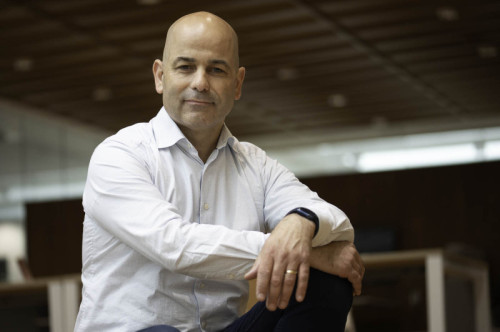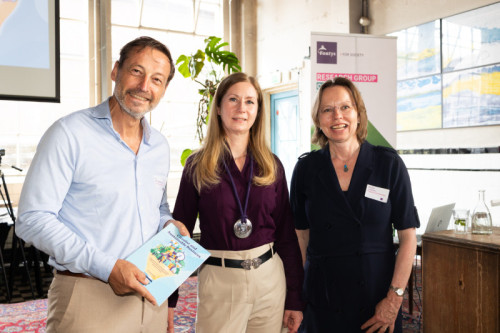Beheersing van de Nederlandse taal blijkt voor veel studenten een struikelblok in hun studie, zeker als Nederlands niet hun moedertaal is. De nieuwe Fontysminor ‘Nederlands I voor Anderstaligen’ biedt uitkomst. Deze minor start in februari 2024, naast de reguliere minor Nederlands. Vijf studenten, Andréa, Uros, Ramy, Bibi en Sophie, vormden afgelopen maanden een pilotgroep. Hoe hebben zij deze periode ervaren?
Andréa studeert Toegepaste Psychologie, komt oorspronkelijk uit Brazilië en heeft Portugees als moedertaal. Ze is getrouwd met een Nederlandse man en heeft drie zonen. Ze kan zich goed uitdrukken in het Nederlands, maar wilde de taalregels bewuster leren toepassen. “De afgelopen weken in deze groep zijn me heel goed bevallen. Ik voel me enorm gemotiveerd door de docenten die zo overduidelijk van de Nederlandse taal houden. Ik ben me een stuk bewuster geworden van de regels en kan deze nu uitleggen aan mijn zonen, die heel goed zijn in Nederlands, maar mij niet altijd konden vertellen hoe het precies zat. Aan tafel praten we veel over taal. Laatst heb ik ze verteld dat het ‘ik besef’ is en niet: ‘ik besef me’, wat ik een van hen hoorde zeggen. Dat gaf me een goed gevoel.”
Uros uit Servië
Uros komt uit Servië en studeert ICT. Zijn grootste doel was zijn grammatica te verbeteren. “Ik heb twee keer eerder een taalcursus gedaan, maar niet eerder was het zo leuk als in deze minor. Er is veel persoonlijke aandacht en de lessen zijn heel interactief – iedereen wordt betrokken. De uitleg is super en heel gedetailleerd. In het verleden gebruikte ik vaak de Duitse zinsstructuur. Nu weet ik hoe het in het Nederlands moet, dat het bijvoorbeeld ‘de korte film’ is en ‘een kort filmpje’. Dingen die voor moedertaalsprekers vanzelfsprekend zijn, maar die wij heel bewust moeten aanleren.”
Bibi uit Afghanistan
“De extra coaching die wij bij Schrijfvaardigheid kregen, was heel fijn”, zegt Bibi, student Medisch Beeldvormende en Radiotherapeutische Technieken (BMRT). Oorspronkelijk komt Bibi uit Afghanistan; haar moedertaal is Dari. “In deze groep zitten we allemaal op hetzelfde niveau. Daardoor durf ik veel meer vragen te stellen. Ik heb veel geleerd, over grammatica, gebruik van leestekens, schrijven van een sollicitatiebrief en ook mijn leesvaardigheid is verbeterd. Voor mij mag er nog meer aandacht zijn voor het lezen van wetenschappelijke artikelen als voorbereiding op de scriptie. Daar worstel ik nog wel mee: hoe verwerk je efficiënt een grote hoeveelheid lange teksten?”
Ramy uit Canada
Ramy komt uit Canada en heeft Engels en Frans als moedertaal. Ramy studeert ICT en zijn doel was om zich comfortabel te voelen in het gebruik van de Nederlandse taal. “Voor een groot deel is dat gelukt de afgelopen drie maanden. Mijn grammatica is sterk verbeterd, alleen mijn woordenschat mag nog meer gaan groeien. Mijn opleiding is in het Engels en ook privé merk ik dat mensen als vanzelf Engels met mij gaan praten. Ik wil de komende tijd vaker bewust voor Nederlands kiezen.” Over comfortabel gesproken: Ramy voelt zich goed thuis in de groep. “Het onderwijs en de sfeer zijn erg motiverend; daarnaast is het ook heel gezellig.”
Sophie uit Australië
“Erg waardevol en verrassend”, zegt Sophie over de afgelopen periode. Sophie is van huis uit Engelstalig en is vanuit Australië naar Nederland gekomen, waar ze nu Fysiotherapie studeert bij Fontys. “Ik wilde leren om met meer zelfvertrouwen te spreken en ik ben heel blij dat me dat gelukt is. Ik merk het als ik voor de groep presenteer, maar ook in alledaagse gesprekken. In deze klas durf ik veel meer dan anders mee te doen; we herkennen veel in elkaar en leren van elkaars vragen.”
Voor meer informatie: kijk op Kies op Maat
Auteur: Marian de Wijs
English
Five students about the pilot minor in Dutch I for non-native Speakers
‘In this group, I dare to ask a lot more questions’
Mastering the Dutch language proves to be a stumbling block for many students in their studies, especially if Dutch is not their native language. The new Fontys minor ‘Nederlands I voor Anderstaligen’ aims to provide a solution. This minor will start in February 2024, alongside the regular minor in Dutch. Five students, Andréa, Uros, Ramy, Bibi and Sophie, formed a pilot group in recent months. How did they experience this period?
Andréa studies Applied Psychology, is originally from Brazil and has Portuguese as her mother tongue. She is married to a Dutch man and has three sons. She can express herself well in Dutch, but wanted to learn to apply the language rules more consciously. “The past few weeks in this group have been really good for me. I feel enormously motivated by the teachers who so obviously love the Dutch language. I’ve become a lot more aware of the rules and can now explain them to my sons, who are very good at Dutch but couldn’t always tell me exactly how it was. At the table, we talk a lot about language. The other day I told them that it is “I realize” and not, “I realize me,” which I heard one of them say. That made me feel good.”
Uros is from Serbia and is studying ICT. His biggest goal was to improve his grammar. “I have done language courses twice before, but not before was it as fun as in this minor. There is a lot of personal attention and the classes are very interactive – everyone gets involved. The explanations are super and very detailed. In the past I often used the German sentence structure. Now I know how to do it in Dutch, that it is for example ’the short film’ and ‘a short film’. Things that are obvious to native speakers, but that we have to learn very consciously.”
“The extra coaching we received in Writing Skills was very nice,” says Bibi, a Medical Imaging and Radiotherapy Techniques (BMRT) student. Originally, Bibi is from Afghanistan; her native language is Dari. “In this group, we are all on the same level. As a result, I dare to ask a lot more questions. I have learned a lot, about grammar, use of punctuation, writing a cover letter and my reading skills have also improved. For me, there could be even more attention to reading scientific articles in preparation for the thesis. I still struggle with that: how do you efficiently process a large amount of long texts?”
Ramy is from Canada and is a native English and French speaker. Ramy is studying ICT and his goal was to get comfortable using the Dutch language. “To a large extent, I have succeeded in doing that over the past three months. My grammar has improved a lot, only my vocabulary needs to start growing more. My education is in English and also privately I notice that people start speaking English to me as a matter of course. I want to consciously choose Dutch more often in the near future.” Speaking of comfortable: Ramy feels comfortable in the group. “The teaching and the atmosphere are very motivating; in addition, it is also very pleasant,” he says.
“Very valuable and surprising,” Sophie says of the past period. A native English speaker, Sophie came to the Netherlands from Australia, where she is now studying Physical Therapy at Fontys. “I wanted to learn to speak more confidently and I am very happy that I succeeded. I notice it when I present in front of the group, but also in everyday conversations. In this class I dare to participate much more than usual; we recognize a lot in each other and learn from each other’s questions.”
For more information: check out Kies op Maat


